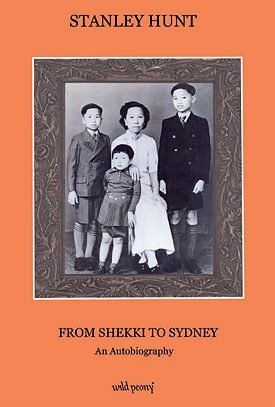|
|
Read extracts and review, Stanley Hunt, From Shekki to Sydney‘I made some calculations and read some books about the motel industry. I visited a few motels and spoke with the owners who were only too happy to explain what they knew about the industry. Dad and I then had some lengthy discussions about whether or not we should venture into this new area of development. We decided that we would. We bought a tea-room with five acres of land attached to it at the Cross Roads in Liverpool, then engaged an architect to draw up plans for a twelve-unit motel. We arranged finance from the Bank of New South Wales, and put in a DA to Liverpool Council. After prolonged negotiations, we finally managed to get approval for an eleven-unit motel. Under the direction of the architect, we engaged a local builder whom I knew. These were great mistakes. The architect had never designed a motel, and the builder only knew how to put up cottages.’ ‘Life was not easy. Mum would often admonish me, telling me that as the eldest son it was my prime duty to assist Dad. She added that he was really a softy and kind-hearted. Dad would have given the shirt off his back if he saw someone who needed it. I served him sincerely, with all my heart, giving him all I could, regardless of how little I was paid. Thankfully, I was able to cast aside my self-pity, self-doubt and misery. I have never wavered in my work, and finally perseverance, loyalty and love overcame all. Dad was tough with me because I was the eldest. He believed that a piece of jade needed to be chiselled to bring out its fine quality, and that pig iron could only become steel if it was subjected to the furnace. 'The author is a highly observant "outsider" as he grows from boy to man and is transformed into an "insider"'from Asian Australian Studies Research Network, 23 January 2010'In the late 19th and early 20th centuries, large numbers of Chinese travelled to the USA, Australia and other parts of the world to prospect for gold or to work as labourers, gardeners and traders, but there are few eyewitness accounts of the lives of these people who predominantly came from South China. Stanley Hunt's From Shekki to Sydney fills part of that gap in Chinese and Australian social history by documenting his childhood in Shekki, his experiences after relocating to Australia, and the lives of his parents and grandparents. His story will resonate with those of many silent others all over the world. Stanley Hunt was born Chan Pui-Tak in Shekki, Zhongshan county, Guangdong province, China. The Japanese had invaded North China and were beginning to bomb Shekki and the nearby coastal areas of South China when he, his mother and two younger siblings left home to join his father in Australia. Reunited in Sydney on 5 April 1939, the small family travelled north to the country town of Warialda, where his father ran a general store. Australian troops were fighting in Europe and Asia, the country was still suffering lingering effects of the Great Depression, and his father was on the verge of bankruptcy. On the timely advice of a travelling salesman, his father was able to save himself from financial ruin by negotiating new terms for repaying his accounts. Through times of rations and quotas, the family value-added to their limited supplies, worked very hard and paid off their debts, before relocating to Sydney in early 1945. Stanley and his father acquired businesses and prospered. Stanley is recognised for his significant contributions to social and community work in Australia and China. The father worked in Australia and had only returned to Shekki a couple of times during the author's childhood, so father and son were virtual strangers when they were reunited in Australia in 1939. As a twelve-year-old boy, Stanley began to work as a man alongside his father, and the development of their relationship contains many poignant moments that underscore the impact of "old country" traditions on a younger generation of Chinese maturing into adults in Australia...' |

